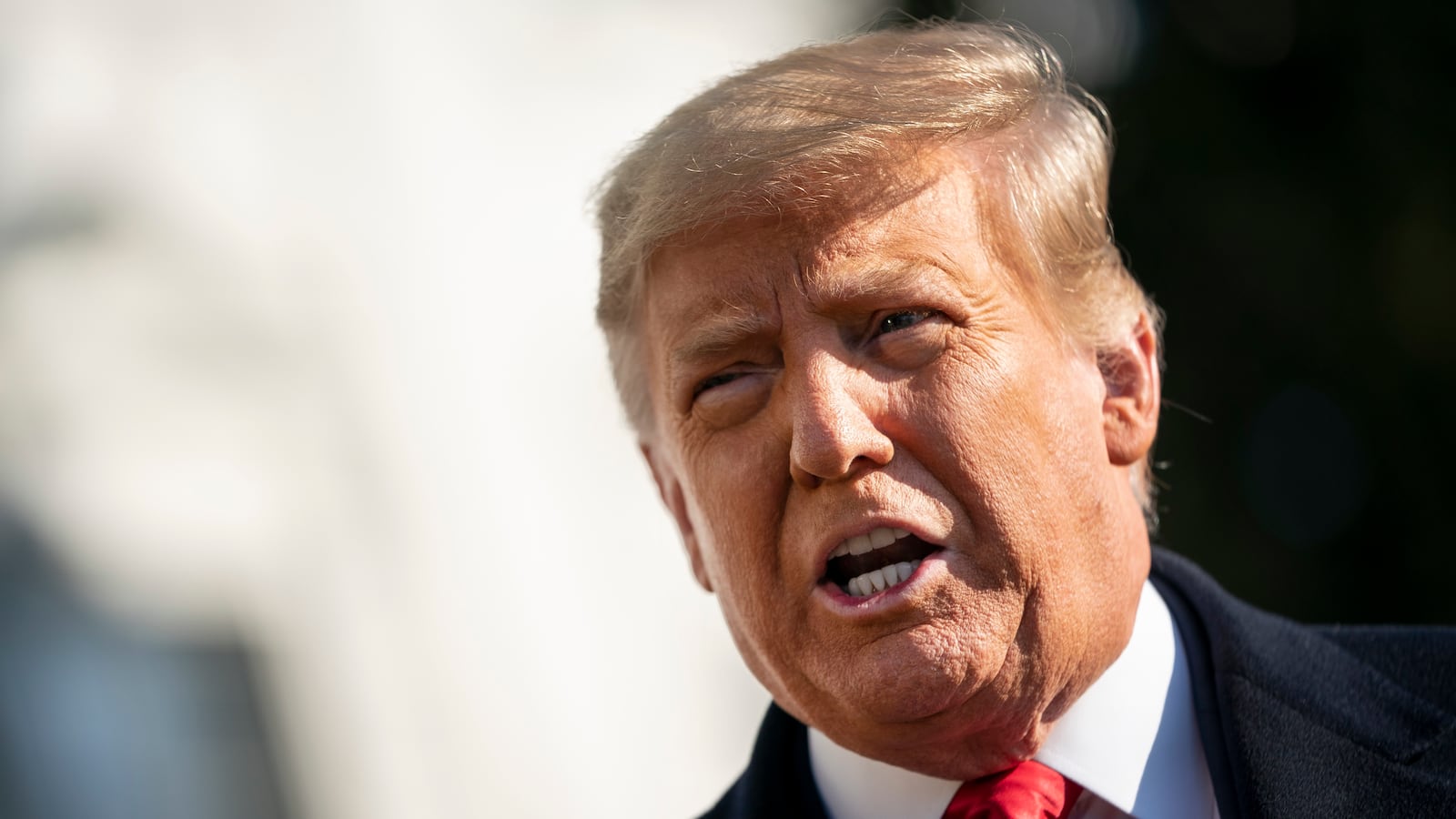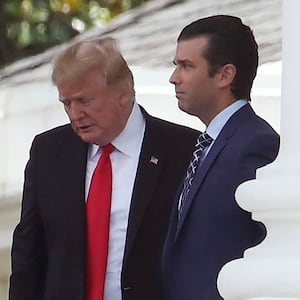Former President Donald Trump is one step closer to testifying in a New York lawsuit filed by a group of protesters who claim his bodyguards assaulted them in 2015.
As The Daily Beast previously reported, the activists had gathered outside Trump Tower to protest the Republican candidate’s derogatory comments on Mexican immigrants. On that September day, soon after the demonstrators assembled on Fifth Avenue outside the skyscraper, several members of Trump’s security team allegedly “violently attacked” them and destroyed their protest banners before a crowd that included reporters.
While president, Trump had tried to quash a subpoena that would force him to testify at the civil trial in the Bronx and sit for a videotaped deposition beforehand. In 2019, his lawyers appealed a judge’s order denying his request.
On Tuesday, the state’s Appellate Division dismissed Trump’s appeal as moot.
“This appeal concerning the proper standard for determining whether a sitting President may be compelled to give videotaped trial testimony about unofficial acts in a civil action against him or her is moot given that the rights of parties will not be directly affected by our determination,” the court said in its ruling, “and that there will not be an immediate consequence of the judgment.”
Benjamin N. Dictor, an attorney for the protesters, said: “We are pleased with the Appellate Division’s decision and look forward to presenting Mr. Trump’s testimony at trial, as would be expected from any adverse party in litigation.” (Dictor is a labor attorney who also represents the NewsGuild, a media workers’ union that represents staffers at many outlets, including The Daily Beast’s editorial union).
Lawyers for Trump could not be reached for comment.
Similarly, the state’s highest court, the Court of Appeals, recently ruled that Summer Zervos’ defamation suit against Trump could proceed because Trump is no longer a sitting president and “the issues presented have become moot.” In that case, Trump called Zervos, a former contestant on The Apprentice, a liar after she came forward in 2016 with allegations he groped her and kissed her without her consent.
The activists behind the Bronx lawsuit include Efrain Galicia, Florencia Tejeda Perez, Gonzalo Cruz Franco, and Miguel Villalobos. (Another plaintiff, Johnny Garcia, died in February 2019.) Trump, his presidential campaign, and the Trump Organization are listed as defendants, as are Trump bodyguards including longtime fixer Keith Schiller, Gary Uher, Edward Jon Deck Jr., and security personnel referred to as John Does 3 and 4.
The plaintiffs, described as “a group of human rights activists of Mexican origin,” had fashioned banners satirizing Trump’s campaign slogan with the words “Trump: Make America Racist Again!” They also wore white robes and hoods after Galicia learned that former Ku Klux Klan leader David Duke had endorsed Trump.
On the afternoon of Sept. 3, 2015, Trump held a press conference inside Trump Tower and journalists and protesters gathered outside. Cruz and Perez waited on a public sidewalk on Fifth Avenue, opposite the building’s entrance.
Soon after Cruz put on his KKK parody costume, Uher allegedly shoved him. While Perez recorded the incident, Deck allegedly ordered her to stop filming and remove her costume before he yanked her by the wrist and shoved her down the sidewalk toward Cruz.
The complaint says reporters began to record and document the tussle, too. Galicia and Garcia arrived with three signs soon after this encounter, setting two banners against cement planters on the sidewalk. According to the suit, Uher and an unnamed guard immediately approached the men and tossed them to the ground.
When Galicia recovered his signs and put them back up, Schiller “swiftly and menacingly approached Galicia” before ripping one of the posters in half and walking off with the other.
Galicia followed Schiller, who allegedly ignored Galicia's demands to return his property, and reached around the guard to retrieve his sign. Schiller then “swung around and struck Galicia with a closed fist on the head with such force that it caused Galicia to stumble backwards,” the complaint alleges. An unnamed guard then “placed his hands around Galicia’s neck in an effort to choke him,” the suit claims.
The complaint includes claims for assault and battery, tortuous interference with political speech, negligent hiring and retention, and negligent supervision.
It was one of 75 court battles that the former president-elect faced in November 2016 as he prepared to move into the White House.
Tuesday’s appellate court ruling comes a year and a half after Bronx County Judge Doris Gonzalez denied Trump's motion to quash the subpoena.
In September 2019, Trump’s legal team—which includes Marc Kasowitz and Lawrence Rosen—filed an appeal claiming the court “erred in failing to determine, as required by the U.S. Constitution and other applicable law, that President Trump was the only source available for testimony” on his ties to the defendants and “in erroneously concluding that the President’s testimony was ‘indispensable’” to the activists’ claims.
This month, the activists’ lawyers—Nathaniel K. Charny, Roger J. Bernstein, and Dictor—filed a motion to dismiss Trump’s appeal as moot “in light of his return to private citizen status.”
In a court filing last week, they added that Trump’s testimony is relevant because the alleged “conduct of the security guards was committed at the express or implied direction, and with express and implied approval of” the reality TV star-turned president.







